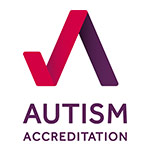Foundation
Many of the pupils who attend Tweendykes are at the early stages of learning how to communicate and to play with others. The Foundation Curriculum is designed to provide developmentally appropriate activities to teach pupils how to communicate, and play.
We focus on four key areas;
Communication- gaining pupils attention and interest and developing pupils understanding of routines and simple language
Cognition- developing pupils' skills in exploring and playing with objects and toys
Personal development- teaching pupils routines and early self-help skills
Physical and sensory- teaching pupils how to keep safe, and how to enjoy physical movement
We aim to create daily lessons that are engaging, fun and exciting to ensure pupils want to explore, and join in activities
What do pupils learn through the foundation curriculum
Pupils learn and develop in the following areas:
Exploration: Pupils are encouraged to explore their environment, materials, and experiences. This stage encourages curiosity, sensory engagement, and the ability to interact with the world around them.
Realisation: This phase helps pupils make connections. They start to understand cause-and-effect relationships and the impact of their own actions.
Initiation: Pupils begin to initiate actions or interactions on their own, taking more control of their learning experiences. This stage encourages independence, where students can communicate their interests or needs.
Anticipation: In this area, pupils learn to predict what may happen next, improving their understanding of routines, sequences, and expectations.
Persistence: Pupils develop the ability to remain focused on a task or activity, even when it becomes challenging.
By focusing on these five areas, the Foundation Curriculum supports pupils in becoming more engaged, independent learners. The curriculum allows each child to progress at their own pace, ensuring that they can reach their full potential.
Pupils’ classroom environments are carefully planned. We aim for: -
A calm atmosphere: Classroom displays, and equipment are limited and set out to help pupils understand how to play and engage.
Consistent routines: Pupils thrive on structure and predictability. We promote consistent routines which help reduce anxiety and provide a sense of safety.
Skilled staff support: Staff are highly trained, and staffing ratios are high ensuring pupils receive support throughout each activity









